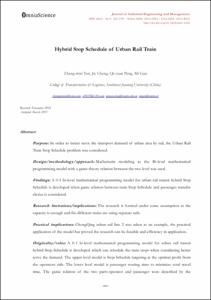Mostra el registre d'ítem simple
Hybrid stop schedule of urban rail train
| dc.contributor.author | Tan, Zhengmin |
| dc.contributor.author | Cheng, Jie |
| dc.contributor.author | Peng, Qiyuan |
| dc.contributor.author | Gan, Mi |
| dc.date.accessioned | 2015-05-27T14:31:37Z |
| dc.date.available | 2015-05-27T14:31:37Z |
| dc.date.issued | 2015-04 |
| dc.identifier.citation | Tan, Zhengmin [et al.]. Hybrid stop schedule of urban rail train. "Journal of Industrial Engineering and Management", Abril 2015, vol. 8, núm. 1, p. 267-279. |
| dc.identifier.issn | 2013-0953 |
| dc.identifier.uri | http://hdl.handle.net/2099/16524 |
| dc.description.abstract | Purpose: In order to better serve the transport demand of urban area by rail, the Urban Rail Train Stop Schedule problem was considered. Design/methodology/approach: Mathematic modeling as the Bi-level mathematical programming model with a game theory relation between the two level was used. Findings: A 0-1 bi-level mathematical programming model for urban rail transit hybrid Stop Schedule is developed when game relation between train Stop Schedule and passenger transfer choice is considered. Research limitations/implications: The research is formed under some assumption as the capacity is enough and the different trains are using separate rails. Practical implications: ChongQing urban rail line 2 was taken as an example, the practical application of the model has proved the research can be feasible and efficiency in application. Originality/value: A 0-1 bi-level mathematical programming model for urban rail transit hybrid Stop Schedule is developed which can schedule the train stops when considering better serve the demand. The upper level model is Stop Schedule targeting at the optimal profit from the operators side. The lower level model is passenger routing aims to minimize total travel time. The game relation of the two parts-operator and passenger were described by the interplay of the two level approach. According to its features, the bi-level model is integrated in order to be directly solvable by optimizing software. |
| dc.format.extent | 13 p. |
| dc.language.iso | cat |
| dc.publisher | OmniaScience |
| dc.rights | Attribution-NonCommercial 3.0 Spain |
| dc.rights.uri | http://creativecommons.org/licenses/by-nc/3.0/es/ |
| dc.subject | Àrees temàtiques de la UPC::Enginyeria civil::Infraestructures i modelització dels transports::Infraestructures i transport ferroviari |
| dc.subject | Àrees temàtiques de la UPC::Matemàtiques i estadística::Investigació operativa |
| dc.subject.lcsh | Railroads--Planning |
| dc.subject.lcsh | Programming (Mathematics) |
| dc.subject.other | Urban transit |
| dc.subject.other | Bi-level programming |
| dc.subject.other | Stop schedule |
| dc.subject.other | Urban rail |
| dc.subject.other | Passenger routing |
| dc.title | Hybrid stop schedule of urban rail train |
| dc.type | Article |
| dc.subject.lemac | Ferrocarrils -- Organització |
| dc.subject.lemac | Programació (Matemàtica) |
| dc.identifier.dl | B-28744-2008 |
| dc.description.peerreviewed | Peer Reviewed |
| dc.rights.access | Open Access |
| local.citation.author | Tan, Zhengmin; Cheng, Jie; Peng, Qiyuan; Gan, Mi |
| local.citation.publicationName | Journal of Industrial Engineering and Management |
| local.citation.volume | 8 |
| local.citation.number | 1 |
| local.citation.startingPage | 267 |
| local.citation.endingPage | 279 |
Fitxers d'aquest items
Aquest ítem apareix a les col·leccions següents
-
2015, vol. 8, núm. 1 [17]


